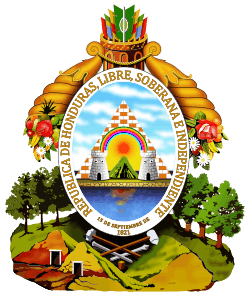Music of Honduras
The music of Honduras is very varied. Punta is the main "ritmo" of Honduras with other sounds such as Caribbean salsa, merengue, reggae, and reggaeton all widely heard especially in the North, to Mexican rancheras heard in the interior rural part of the country. Honduras' capital Tegucigalpa is an important center for modern Honduran music, and is home to the College for Fine Arts.[1]
| Music of Honduras Topics | |
|---|---|
| Reggaeton | |
| Paranda | |
| Bachata | |
| Classical music | Punta |
| Merengue | Hip Hop |
| Latin pop | Cumbia |
| Salsa | Reggae |
| Techno | Electronic Music |
| Timeline and Samples | |
| Central American music | |
| Belize - Costa Rica - El Salvador - Guatemala - Honduras - Nicaragua - Panama | |
Folk music is played with guitar, marimba and other instruments. Popular folk songs include La ceiba and Candú.
Garifuna music
Garifuna originated from escaped Island Caribs who were deported from St. Vincent to Central America (especially Honduras, Belize, Guatemala, and also in Nicaragua in 1802) by the British when they conquered St. Vincent. The Garifunas kept themselves apart from the social system then dominant, leading to a distinctive culture that include chumba and hunguhungu, a circular dance in a three beat rhythm, which is often combined with punta, their national genre.
There are other songs typical to each gender, women's eremwu eu and abaimajani, rhythmic a cappella songs, and laremuna wadauman, men's work songs. Other forms of dance music include matamuerte, gunchei, charikawi and sambai.
Popular Music
Though American music has produced most of the popular music in modern Honduras, the country has produced several well-known musicians such as:
- Banda Blanca
- Delirium
- Sueño Digviana
- Pez Luna
- Sol Caracol
- Maria Isolina
- Dano Cube
- ANIMA
- URANIA
- Ytterbium
- Polache
- Guillermo Anderson
- Javier Monthiel
- Moisés Canelo
- El Pez
- Montuca SoundSystem
- Evolucion Neutra
- Volumen
Reggaeton has been popular in the country for many years, and Honduras has emerged as a leading producer of artists. Notable artists include:
- Raggamofin Killas
- El Pueblo
- Los Bohemios Del Reggaeton
- DJ Slyfox
- DJ Sy (Syrome)
- Bullaka Family
- Yerbaklan
Music Institutions
There is an Orquesta Sinfónica Nacional de Honduras (a national orchestra) and the College for Fine Arts, located in Comayagua.
References
- "Archived copy". Archived from the original on 2011-09-28. Retrieved 2005-05-30.CS1 maint: archived copy as title (link)
Articles
- Campos Fonseca, Susan: “Historia compensatoria y Filosofía: Un caso centroamericano”, en BABAB, Nº33, verano, España, 2008, ISSN · 1575-9385. Disponible en:
- Brill, Mark. Music of Latin America and the Caribbean, 2nd Edition, 2018. Taylor & Francis ISBN 1138053562
- http://www.babab.com/no33/susan_campos.php
